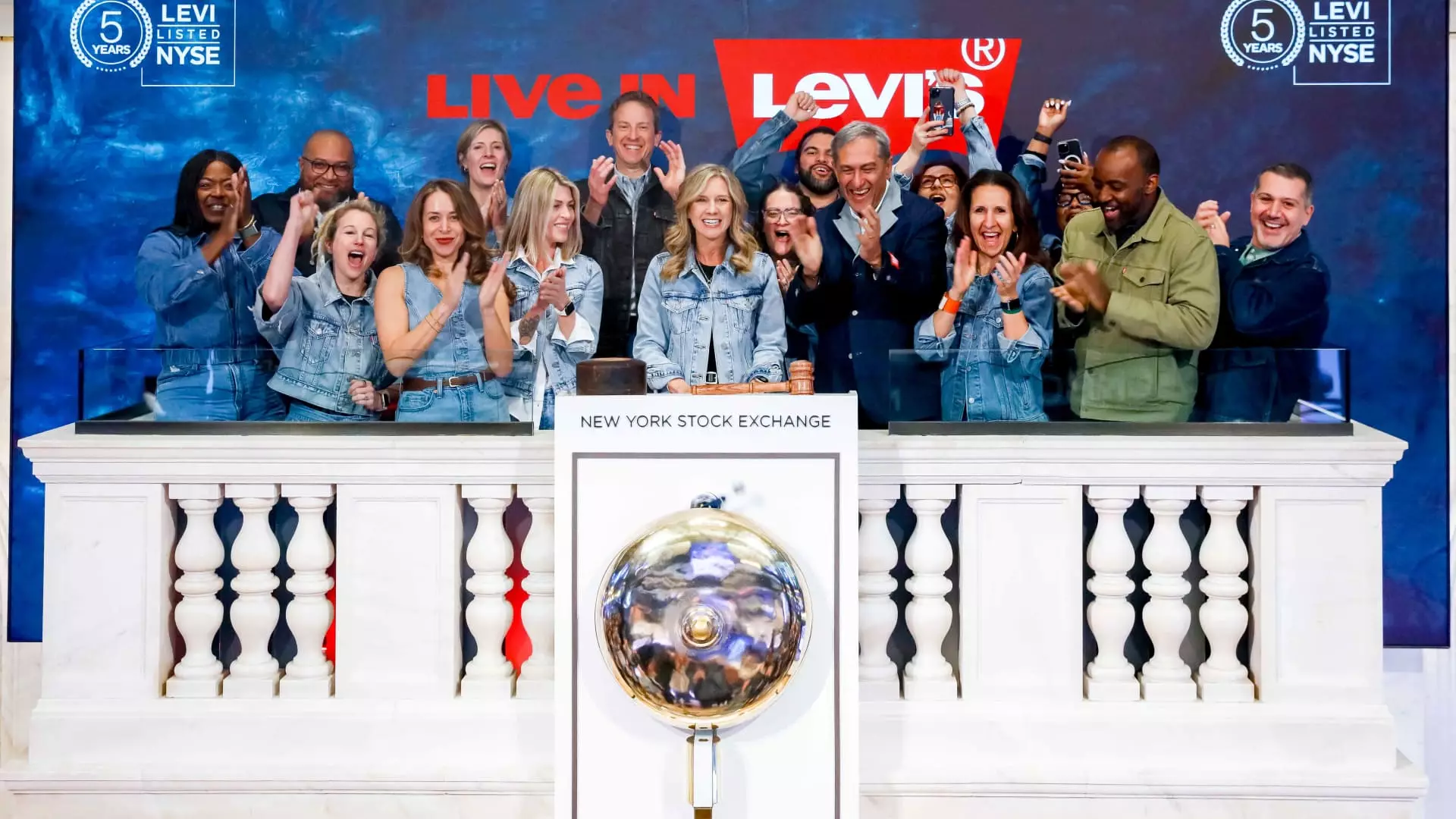Levi Strauss, the iconic jeans manufacturer, has recently made headlines by witnessing an 11% surge in its stock price, a move largely driven by the company’s confidence in maintaining its full-year outlook. This resilience is admirable, but one cannot ignore the elephant in the room: the ominous presence of tariffs that loom over their operations without accounting for their potential impact. The reported 38 cents per share in adjusted earnings, representing a 52% increase from a year ago, is undoubtedly impressive. However, it raises an intriguing question—how sustainable is this growth when the economic winds can shift suddenly due to governmental policy?
Levi’s revenue climbed to $1.53 billion, marking a modest 3% increase from the previous year. While growth is good, let’s not lose sight of the bigger picture. Are we lauding shortsighted results while failing to prepare for potential fallout when tariffs, inflation, or changing consumer preferences come into play? This impressive performance must be tempered with caution and a strategic approach to navigating future challenges.
Health Insurers: The Unexpected Winners in a Political Tug-of-War
Healthcare stocks found themselves on the ascendancy after the Trump administration’s announcement of a significant uptick—5.06%—in payment rates for Medicare insurers, which starkly contrasts with the 2.23% increase proposed under Biden’s administration. Companies like Humana, CVS Health, and UnitedHealth saw share prices skyrocket by 15%, 9%, and 8%, respectively. It presents an exciting scenario for investors, but it also raises an ethical dilemma: what happens when political agendas overshadow the actual needs of patients and healthcare providers?
While these increases in payment rates are certainly good news for investors, one must question the sustainability of this government intervention strategy. A fluctuating political landscape can result in a roller-coaster effect on health stocks, posing challenges for both providers and patients who rely on stable and predictable healthcare costs. Is it wise to celebrate a temporary boon while remaining unaware of the long-term implications of politicizing healthcare funding?
Defense and Technology: The Dual Giants of Stability
Lockheed Martin, the aerospace and defense powerhouse, saw its stock increase by 2% following Vietnam’s declaration to invest in U.S. defense products. The rationale behind this is multifaceted—both a response to national security concerns and an attempt to bridge economic gaps through military procurement. Broadcom, a major player in the technology sector, also enjoyed a 3% spike after announcing a remarkable $10 billion share repurchase program, showcasing the board’s faith in the company’s diverse portfolios.
However, while these developments hint at economic vitality in the defense and technology sectors, there’s an undercurrent of concern regarding the ethical ramifications associated with increased military spending and defense contracts. The rise of technology firms tied closely to military applications might embolden certain geopolitical tensions rather than ameliorating them. In a world increasingly interconnected, can pursuing stock gains justify the ethical dilemmas tied to militarism or surveillance technology?
The Retail Rumble: Resilience Amidst Economic Shadows
Ross Stores and Ralph Lauren recently enjoyed stock price bumps of 2% and 4%, respectively, after Goldman Sachs delivered optimistic upgrades. With Ross expected to perform favorably in a slowed-down economic environment and Ralph Lauren’s global diversification helping to stave off tariff-induced risks, it seems that retail may be finding its footing.
But is this resurgence merely fleeting? Retailers face a host of challenges, from supply chain disruptions to changing consumer behaviors post-pandemic. Wall Street may cheer these minor victories, but the question remains whether such retail optimism is grounded in genuine consumer-centric strategies or merely a response to short-term financial maneuvers. While stock prices increase, fundamental business practices that focus on customer experience must not take a backseat.
Janover: A Cautionary Tale of Speculative Stocks
On a contrasting note, the software company Janover experienced a staggering 17% drop following an incredibly volatile run that saw its valuation soar by over 800% during the prior trading session. This dramatic fall illustrates the unpredictability and risks associated with speculative investments in emerging technologies like cryptocurrencies. While the firm’s foray into Solana tokens generated buzz, it starkly highlights that investor enthusiasm can flip in mere hours.
The relentless pursuit of the next big tech idea can lead to unrealistic valuations that ultimately set investors up for heartbreak when reality sinks in. Is this environment encouraging a sustainable tech culture, or is it setting the stage for a future crash reminiscent of the dot-com bubble? Investors should remember that while staying on the cutting edge of technology is essential, it must also be measured against rational valuation and long-term sustainability.
In today’s market landscape, insights gleaned from these stock movements should not only guide your investments but also encourage a broader conversation about the ethical and economic implications of these trends. Balancing short-term gains with long-term viability should be the watchword for responsible investors navigating these turbulent waters.

